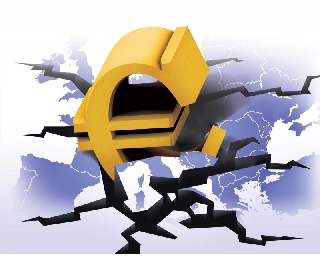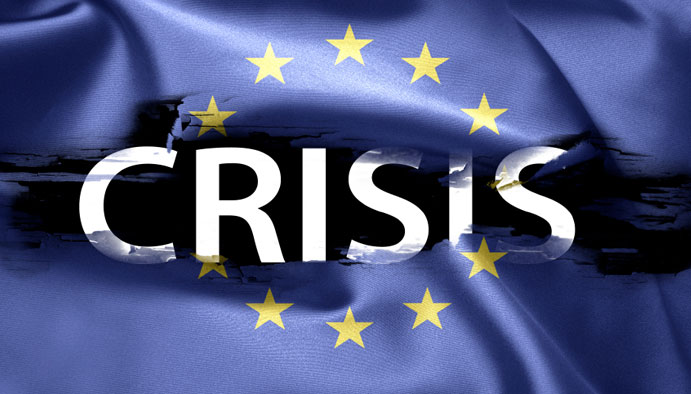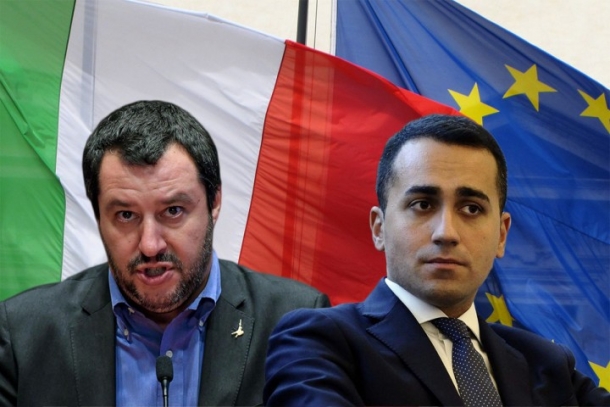A crunch point is approaching in the ongoing saga surrounding the highly-indebted Italian economy. This could spark a revival of the dormant euro crisis.
When the idea of the euro was agreed in the Maastricht Treaty in 1992, it represented the beginning of what was supposed to be a strong, united, successful Europe. For many years, this seemed to be the case (for the capitalist class, at least).
Today, however, the economic stability that was promised is nowhere to be found. And buried within the foundations of this whole system is the ticking time bomb of Italy.
In order to join the single currency, member states were required to meet the treaty's rules in terms of budget deficits, inflation, interest rates and other monetary requirements. In periods of relative stability, these targets commanded little attention. But we are no longer in a period of stability. Rather, we are in an epoch of capitalist crisis.
The crisis of capitalism has brought to the fore all the tensions between the different European economies - all moving at different speeds but tied to the same currency. The latest expression of this contradiction is the rejection of Italy’s new budget by EU finance ministers.
Euro crisis returns
 The current coalition government, headed by the Five Stars and the League, came to power after months of talks and political turbulence. More importantly, it has come to power amidst a decade-long economic crisis that has engulfed Europe ever since the 2008 crash.
The current coalition government, headed by the Five Stars and the League, came to power after months of talks and political turbulence. More importantly, it has come to power amidst a decade-long economic crisis that has engulfed Europe ever since the 2008 crash.
Italy is at the heart of the European Union; the third largest economy in the eurozone. It is just behind France in terms of economic size, making up more than 15% of eurozone GDP. Yet, it has debts of 2.26 trillion euros, equivalent to 132% of GDP. The only other country in the eurozone with a higher debt ratio is Greece.
In particular, the country’s banks are in a mess: weighed down by bad loans and propped up by the government and the European Central Bank (ECB). The Italian banks, in turn, are connected to the banking system across the rest of Europe by a thousand threads. What happens in Italy is therefore of grave concern to leaders across the continent.
At the root of these financial problems is the crisis of Italian capitalism, which has been plagued with low productivity and anaemic growth for decades.
Italy needs to catch up in terms of it economic competitiveness, and with within the restrictions of the single currency this means the new government must undertake an even more severe programme of “internal devaluation”. In plain speak, this means continuing and deepening the attacks on the wages and conditions of Italian workers that the Democratic Party had begun. From the point of view of the bosses, there is no room for concessions on such matters.
The financial markets and their political representatives in Brussels and Frankfurt are putting their foot down. Risk premiums on government bonds are reaching their limits, threatening to plunge Italy’s entire banking system into a liquidity crisis. Yet the coalition’s plan is simple: borrow more!
Political instability
 Matteo Salvini - Deputy Prime Minister of ItalyThe previous Italian government had agreed to achieve a budget deficit of 1.6% of GDP in 2019. However, the new budget proposed by the recently formed Five Star and League coalition forecasts a deficit of 2.4%.
Matteo Salvini - Deputy Prime Minister of ItalyThe previous Italian government had agreed to achieve a budget deficit of 1.6% of GDP in 2019. However, the new budget proposed by the recently formed Five Star and League coalition forecasts a deficit of 2.4%.
Included in this budget are a wage for the unemployed and a roll back of the much-hated pension cuts that were introduced by the previous Democratic Party-led government.
It was on the basis of these policies that the current coalition parties were elected in the first place, with ordinary Italians sick and tired of the traditional, establishment parties.
These promises, however, have quickly come into conflict with the austerity that is enshrined into the EU’s rules and regulations. Financial markets and EU officials have moved against the Italian government, asserting that their spending plans are too high and must be brought down by any means necessary. As a result, Pierre Moscovici, the European Commissioner for Economic and Financial Affairs, has stated that the Italian budget must be revised and resubmitted by 13th November. Such a rejection of a national budget by EU technocrats is unprecedented.
This has not been met well by the Italian coalition government, who are now fomenting anti-EU sentiments back home. Their strategy is to play a game of chicken, in which they hope the EU leaders will panic and back down.
Contagion
The threat of Italy following Britain out of Europe will most definitely have crossed the minds of the European leaders. According to a poll conducted by the European Commission, only 44% of Italians now support membership of the EU. The possibility of Italy announcing its departure and landing a deathblow against an already fragile European Union is therefore not implausible.
More likely, however, is that the Italian government will capitulate and be forced to revise its budget, implementing an austerity programme that goes against previous campaign promises.
This would serve to enrage all those who voted for these 'anti-establishment' parties in Italy, precisely because they wanted a break with the status quo of attacks and austerity. Bowing now to Brussels' diktats would therefore only plunge Italian - and European - capitalism into an even deeper social, political and economic crisis.
 But Italy does not exist in isolation. The real fear of the European leaders is the risk of contagion, with instability on the financial markets and discontent towards EU institutions spreading across the continent. Every country in Europe is in the same sinking boat; Italy just happens to be at the end where water levels are rising fastest at this stage.
But Italy does not exist in isolation. The real fear of the European leaders is the risk of contagion, with instability on the financial markets and discontent towards EU institutions spreading across the continent. Every country in Europe is in the same sinking boat; Italy just happens to be at the end where water levels are rising fastest at this stage.
After the chaotic events in Greece, the European establishment are desperate to avoid a second wave of the eurozone crisis. This explains their actions in rejecting the Italian budget. But in reality the euro crisis never really went away. Through their actions, the EU and ECB ministers have simply delayed the moment of reckoning.
Attempts to restore economic stability in Italy will provoke political and social instability, as workers and youth are asked to pay for the crisis of capitalism. In combination with the threat of a hard (or no-deal) Brexit and Trump’s protectionist policies, this leaves the EU in an highly uncertain and unsustainable situation. For the working class in Italy and across the rest of Europe, the need to fundamentally transform society has never been clearer.

